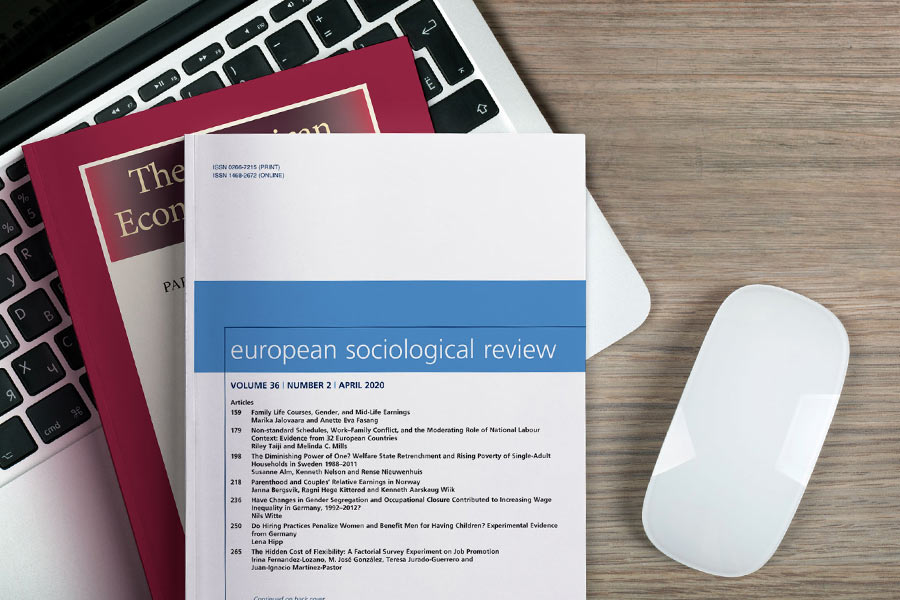Total hits 17.461
-
Addressing the needs and demands of child welfare: A connection between AI Ethics and Ethics of Vulnerability
Schlögl-Flierl, K. & Ziethmann, P. (2024): Addressing the needs and demands of child welfare: A connection between AI Ethics and Ethics of Vulnerability. In: (2024): Künstliche Intelligenz und ethische Verantwortung, Bielefeld, Transcript p. 85-100. DOI:10.14361/9783839469057-006
-
Fairer Kohleausstieg für alle: Jobwechsel statt Frühverrentung fördern
Koch, N. & Janser, M. (2024): Fairer Kohleausstieg für alle: Jobwechsel statt Frühverrentung fördern. In: Transforming Economies No. 26.06.2024.
-
Eine Anschubhilfe im Bürgergeld könnte die Erwerbsanreize erheblich stärken (IAB-Debattenbeiträge)
Weber, E. (2024): Eine Anschubhilfe im Bürgergeld könnte die Erwerbsanreize erheblich stärken (IAB-Debattenbeiträge). In: IAB-Forum No. 26.06.2024 Nürnberg. DOI:10.48720/IAB.FOO.20240626.01
-
IAB-Monitor Arbeitskräftebedarf 1/2024: Die Zahl der offenen Stellen ist im Vergleich zum Vorjahresquartal um rund ein Zehntel gesunken (Serie Arbeitskräftesicherung )
Gürtzgen, N., Kubis, A. & Popp, M. (2024): IAB-Monitor Arbeitskräftebedarf 1/2024: Die Zahl der offenen Stellen ist im Vergleich zum Vorjahresquartal um rund ein Zehntel gesunken (Serie Arbeitskräftesicherung ). In: IAB-Forum No. 25.06.2024 Nürnberg. DOI:10.48720/IAB.FOO.20240625.01
-
Wirksame Instrumente mit punktuellem Verbesserungsbedarf: Impulse zur Weiterentwicklung des Teilhabechancengesetzes (Serie: Eingliederung von Langzeitarbeitslosen und Teilhabe am Arbeitsmarkt)
Gellermann, J. & Ramos Lobato, P. (2024): Wirksame Instrumente mit punktuellem Verbesserungsbedarf: Impulse zur Weiterentwicklung des Teilhabechancengesetzes (Serie: Eingliederung von Langzeitarbeitslosen und Teilhabe am Arbeitsmarkt). In: IAB-Forum No. 24.06.2024. DOI:10.48720/IAB.FOO.20240624.01
-
Return intentions among Ukrainian refugees in Europe: A Cross-National Study
Tubergen, F., Wachter, G., Kosyakova, Y. & Kogan, I. (2024): Return intentions among Ukrainian refugees in Europe: A Cross-National Study. In: International Migration, Vol. 62, No. 5, p. 181-198. DOI:10.1111/imig.13291
-
Subjektive soziale Teilhabe: Die Kluft zwischen Personen mit SGB-II-Leistungsbezug und Gesamtbevölkerung ist während der Pandemie nicht gewachsen
Bähr, S. & Collischon, M. (2024): Subjektive soziale Teilhabe: Die Kluft zwischen Personen mit SGB-II-Leistungsbezug und Gesamtbevölkerung ist während der Pandemie nicht gewachsen. In: IAB-Forum No. 20.06.2024. DOI:10.48720/IAB.FOO.20240620.01
-
Immigrants' Pathways to the Income Elite in Germany
Collischon, M., Wunder, A. & Zimmermann, F. (2024): Immigrants' Pathways to the Income Elite in Germany. In: Sociology, Vol. 58, No. 5, p. 1225-1236. DOI:10.1177/00380385241257485
-
Wie hoch ist der Anteil der unbesetzten Ausbildungsstellen wirklich? Warum unterschiedliche Zahlen ausgewiesen werden
Fitzenberger, B., Leber, U. & Schwengler, B. (2024): Wie hoch ist der Anteil der unbesetzten Ausbildungsstellen wirklich? Warum unterschiedliche Zahlen ausgewiesen werden. In: IAB-Forum No. 19.06.2024 Nürnberg. DOI:10.48720/IAB.FOO.20240619.01
-
Betriebe in der ökologischen Transformation
Hohendanner, C., Janser, M. & Lehmer, F. (2024): Betriebe in der ökologischen Transformation. (IAB-Forschungsbericht 13/2024), Nürnberg, 24 p. DOI:10.48720/IAB.FB.2413
-
Für eine Rente mit Zukunft
Kindermann, F. & Weber, E. (2024): Für eine Rente mit Zukunft. Gastkommentar. In: Handelsblatt No. 18.06.2024.
-
Ein weites Feld: Silke Anger und Bernd Fitzenberger über die Bedeutung der Bildungsforschung am IAB (Interview)
Schludi, M.; Fitzenberger, B. & Anger, S. (sonst. bet. Pers.) (2024): Ein weites Feld: Silke Anger und Bernd Fitzenberger über die Bedeutung der Bildungsforschung am IAB (Interview). In: IAB-Forum No. 17.06.2024. DOI:10.48720/IAB.FOO.20240617.01
-
Institutionelle Hürden beeinflussen Umfang und Qualität der Erwerbstätigkeit von Geflüchteten
Brücker, H., Ehab, M., Jaschke, P. & Kosyakova, Y. (2024): Institutionelle Hürden beeinflussen Umfang und Qualität der Erwerbstätigkeit von Geflüchteten. (IAB-Forschungsbericht 12/2024), Nürnberg, 46 p. DOI:10.48720/IAB.FB.2412
-
A broad field: Silke Anger and Bernd Fitzenberger on the importance of educational research at IAB (Interview)
Schludi, M. (2024): A broad field: Silke Anger and Bernd Fitzenberger on the importance of educational research at IAB (Interview). In: IAB-Forum No. 17.06.2024. DOI:10.48720/IAB.FOO.20240617.02
-
Locations where new work creation has been larger were also locations where employment levels grew more quickly
Gerber, M. & Winters, J. (2024): Locations where new work creation has been larger were also locations where employment levels grew more quickly. In: IAB-Forum No. 14.06.2024. DOI:10.48720/IAB.FOO.20240614.01
-
Vocational training: Occupations with green skills are in high demand (Series: Digital and ecological Transformation)
Brixy, U., Janser, M. & Mense, A. (2024): Vocational training: Occupations with green skills are in high demand (Series: Digital and ecological Transformation). In: IAB-Forum No. 12.06.2024 Nürnberg. DOI:10.48720/IAB.FOO.20240612.01
-
Alternde Belegschaften in der Chemieindustrie vor und während der Corona-Krise. Chancen der Beschäftigung Älterer im disruptiven Arbeitsmarkt
Brandl, S., Engin-Stock, T., Leber, U., Matuschek, I. & Mayerböck, A. (2024): Alternde Belegschaften in der Chemieindustrie vor und während der Corona-Krise. Chancen der Beschäftigung Älterer im disruptiven Arbeitsmarkt. (IAB-Forschungsbericht 11/2024), Nürnberg, 57 p. DOI:10.48720/IAB.FB.2411
-
The wage subsidy titled “Integration of the long-term unemployed” shows high and stable employment effects for welfare recipients
Kasrin, Z. & Tübbicke, S. (2024): Das Instrument „Eingliederung von Langzeitarbeitslosen“ im SGB II: Der Lohnkostenzuschuss zeigt hohe und stabile Beschäftigungseffekte. (IAB-Kurzbericht 13/2024), Nürnberg, 8 p. DOI:10.48720/IAB.KB.2413
-
Bei der IT-Ausstattung und Internetnutzung sind Personen mit SGB-II-Leistungsbezug gegenüber der Gesamtbevölkerung vielfach im Rückstand
Bähr, S. & Trappmann, M. (2024): Bei der IT-Ausstattung und Internetnutzung sind Personen mit SGB-II-Leistungsbezug gegenüber der Gesamtbevölkerung vielfach im Rückstand. In: IAB-Forum No. 10.06.2024. DOI:10.48720/IAB.FOO.20240610.01
-
Earnings assimilation of post-reunification East German migrants in West Germany
Riphahn, R. & Sauer, I. (2024): Earnings assimilation of post-reunification East German migrants in West Germany. In: Labour, Vol. 38, No. 4, p. 475-510. DOI:10.1111/labr.12279



